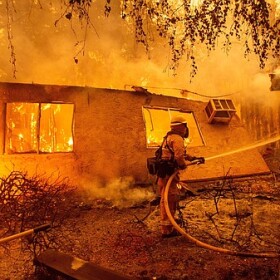Each year, thousands of students across the country read Anne Frank’s “Diary of a Young Girl” and Elie Wiesel’s “Night” for a glimpse into the unimaginable horrors of the Holocaust. Rose Schindler hopes her new book, “Two Who Survived,” will join that canon of literature.
The book tells the stories of Schindler and her husband, Max, both separated from their families and placed into concentration camps, and how they were able to start a family together in the United States while grappling with their experiences during the Holocaust.
On Wednesday, Schindler spoke in front of more than 100 students at Ramona High School. She’s been telling her story to students for more than 40 years, in addition to countless speaking engagements at military bases, churches and synagogues.
“I never say no because it’s so important to tell the world what happened to us,” she said. “So many people don’t have any idea what happened to us during the Second World War.”
“Two Who Survived” narrates the experiences of Schindler and her husband in alternating chapters. It was written in their voice and first-person narration by M. Lee Connolly. Their son, Ben Schindler, published the book.
Ben said the book belongs in classrooms alongside other seminal works about the Holocaust. The book, he said, offers a broader scope, beyond the years of World War II and into the lives of his parents after they emigrated to the U.S.
“When we wrote the memoir, people told me your parents can speak as if they know what’s going to happen because the book is written after the fact,” Ben said. “But they can still stay in first person while they’re telling the story.”

The book’s publication comes two years after the death of Max Schindler, who was 87. His headstone reads, “Always keep moving forward.”
Ramona High students lined up for autographed copies of “Two Who Survived” following the presentation. The books were printed on acid-free paper with library binding and a sewn spine.
“These are books that are going to be around for a hundred years,” Ben said.
Ben said he hopes students can appreciate how both his parents were “rehabilitated” into “loving and productive members of society” without being overcome by their own trauma.
“My mother’s biggest lesson was never give up hope,” he said. “My father’s biggest lesson was tomorrow will always be a better day.”







